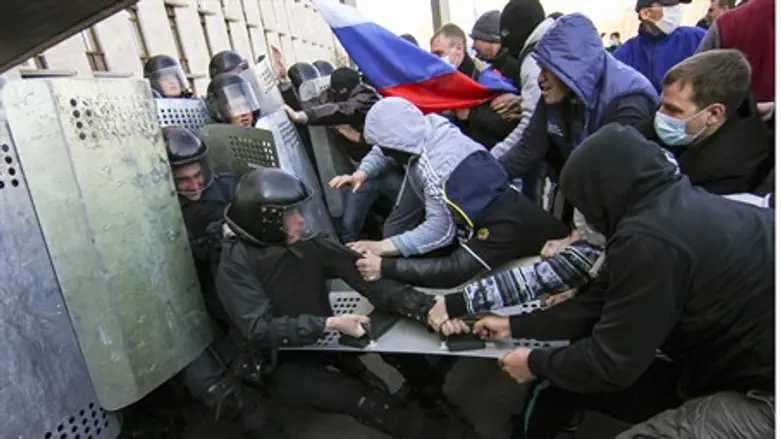
A tense standoff continues in eastern Ukraine Wednesday, where pro-Russian separatists have been demonstrating for the right to secede.
Donetsk, Kharkiv, and Luhansk are at the center of the standoffs, which acting Interior Minister Arsen Avakov insisted will end in 48 hours - whether by negotiation or by force.
"There are two opposite ways for resolving this conflict -- a political dialogue and the heavy-handed approach. We are ready for both," he said, according to official news agency Ukrinform.
Over 40,000 Russian troops are reportedly waiting near the Ukrainian border, raising concerns of another de facto military invasion in Ukraine. At least one protestor has called for Moscow to do just that, and "liberate" Ukrainians from the new pro-EU government.
But Russia's Foreign Ministry insisted Wednesday that there is "no reason for concern" about the presence of Russian forces, which it claims are merely in the midst of training exercises.
"Russia has repeatedly stated that it does not conduct unusual or unplanned activities which are militarily significant on its territory near the border with Ukraine," the Foreign Ministry said, calling accusations of a planned attack "groundless."
Meanwhile, the protestors' outrage is snowballing, according to Reuters, after the Ukrainian government has repeatedly referred to them as "terrorists."
"Of course we must ask Russia to take us in because I don't see an alternative," said a man dressed in camouflage, standing outside the former KGB building in Luhansk. The building had been overtaken by demonstrators earlier this week, during the breakout of protests in the region. Then man gave his name as Vasiliy and said he was the commandant of the building.
"Putin, help us!" he said.
Focus has also shifted to Donetsk, which has been the seat of pro-Russian tensions since earlier this month, when neighboring Crimea held a controversial referendum vote and was annexed by Moscow after a de facto military invasionof the region.
The annexation led to a bold call from Ukraine's now-deposed President, Viktor Yanukovych, to hold referendums nationwide - and let other provinces decide their national allegiances to either Russia or Ukraine. Analysts suspect the move may have escalated tensions in eastern Ukraine and could have contributed to the current crisis there.